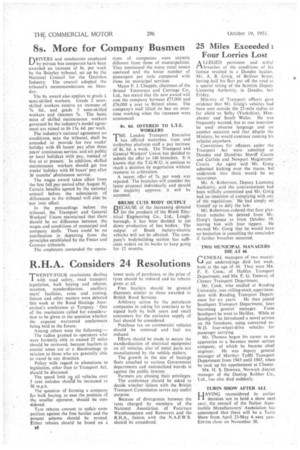R.H.A. Considers 24 Resolutions
Page 42

If you've noticed an error in this article please click here to report it so we can fix it.
TWENTY-FOUR resolutions dealing 1 with road safety, road transport legislation, bulk buying and rebates, taxation, standardization, ancillary users' facilities, rates and costing, liaison and other matters were debated this week at the Road Haulage Association's conference at Torquay. ' On of the resolutions called for consideration to be given to the question whether the expense warranted conferences being held in the future.
Among others were the following:— The radius granted to operators who were formerly able to exceed 25 miles should be reviewed, because hauliers in coastal ,areas are at a disadvantage in relation to those who are generally able to travel in any direction.
Policy with regard to alterations to legislation, other than to Transport Act, should be discussed.
The speed limit og all vehicles over 3 tons unladen should be increased to 30 m.p.h.
The question of forming a company for bulk buying, to ease the position of the smaller operator, should be considered.
Tyre rebates amount to unfair competition against the free haulier and the present scheme should be revised. Either rebates should be based on a ei8 lower scale of purchases, or the price of tyres should be reduced and ho rebates given at all.
Free hauliers should be granted discounts similar to those awarded to British Road Services.
Arbitrary action by the petroleum companies in asking for contracts to be signed both by bulk users and small consumers for the exclusive supply of fuel should be considered.
Purchase tax on commercial vehicles should be removed and fuel tax reduced.
Efforts should be made to secure the standardization of electrical equipment on all vehicles, also of metal parts not manufactured by the vehicle makers.
The growth in the size of haulage fleets attached to various Government departments and nationalized boards is against the public interest.
Farmers are abusing their privileges.
The conference should be asked to decide whether liaison with the British Transport Commission serves any useful purpose.
Because of divergences between the rates charged by members of the National Association of Furn4tire Warehousemen and Removers and the R.H.A., liaison with the N.A.F.W.R. should be considered.




































































































